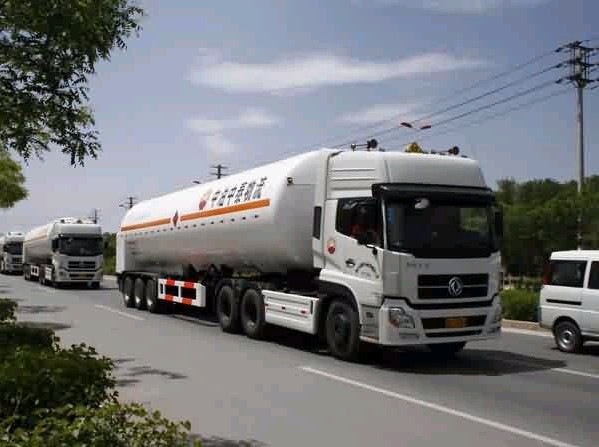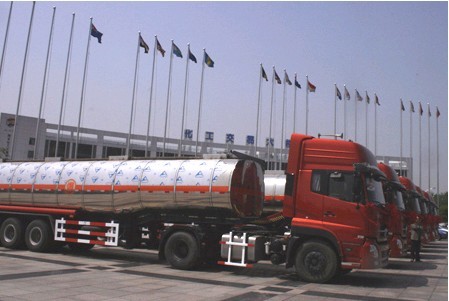Separate your subjects and keep all of your notes, doodles, clippings and worksheets in the one fresh notebook. Fitted out with in-house designs, tabbed (and pocketed) subject dividers and spiral bound for easy tear away. This will immediately become your new study buddy and fav coworker. Paper Notebooks,Spiral Notebooks,Printed Notebook Paper,Handmade Paper Notebook Shenyang Meitu Artical Printing Co.,Ltd , https://www.mtpaperbag.com
With the rapid development of China's petrochemical industry, the petrochemical product transportation industry has gradually grown. Among these, road transport plays an important role, and some professional logistics companies are springing up. However, behind the prosperous industry development trend, the shadow of safety hazards has not been dispersed, resulting in frequent accidents that not only cause economic losses but also endanger life safety and social environment.
From June 5 to June 9, 2011, there were two incidents involving dangerous chemicals transportation vehicles in Hangzhou within four days. One of these accidents almost jeopardized the water security of the entire city. A series of social problems caused people to focus on the danger. Chemical vehicle market. 
According to the "Dangerous Chemicals Directory," the first category is explosives; the second category is compressed gas and liquefied gas; the third category is flammable solids, spontaneous combustion and wet flammable materials; the fourth category is toxic products; The fifth category is flammable liquids; the sixth category is oxidants and organic peroxides, and the seventh category is corrosion products.
Dangerous chemicals transportation market is chaotic
Antai Logistics Co., Ltd. believes that: "There are few accidents during professional operations. The company has more than 1,000 vehicles running to transport, and there are not a few vehicles specially designed for the transport of dangerous chemicals. The main transportation of dangerous chemicals of 2-7 categories is usually Few transportation companies are engaged in this kind of transportation."
It is understood that in the past, transportation of hazardous chemicals was carried by the military. Later, with the development of the domestic petrochemical industry, some hazardous chemicals transportation was gradually undertaken by professional logistics companies.
In the conditions for applying for permission of road transport of dangerous chemicals, the bottom line for the number of dangerous chemicals transport vehicles is 5 vehicles. At present, there are only a few professional companies engaged in the transportation of hazardous chemicals in China, and most of them are self-employed to purchase dangerous goods vehicles for logistics transportation. Although the relevant departments have a strict examination and approval system for the transportation of dangerous chemicals, there are still many transport companies in the society that are outside the line of sight of the industry management department, such as individual owners with unlicensed operations and illegal transportation.
None of these individual owners has the qualification for transporting dangerous chemicals, and unfair competition is achieved by means such as depressing freight rates. Because existing law enforcement forces have difficulty in achieving full control over all sections of the jurisdiction, coupled with the lack of knowledge of many law enforcement personnel in the chemical industry, it is currently difficult to manage hazardous chemicals vehicles. 
Industry Security Vulnerabilities
At present, there are frequent accidents involving the transportation of dangerous chemicals, but there are relatively few cases of extraordinary safety accidents. Most of the cases are problems such as leakage, and the overall safety situation is still stable. However, there are many problems in the hazardous chemicals transportation industry. The relevant departments do not have enough understanding of the importance of hazardous chemicals transportation management. In addition, the traffic violations of hazardous chemicals vehicles are more prominent, and there are warning signs that do not follow the regulations, and do not press Regulations such as driving, overloading, illegal temporary parking, etc.
Some chemical products in the road transport are generally not in compliance with the permit regulations. Some hazardous chemical transport companies that do not have operational qualifications change the transport vehicles, drivers, escorts, transportation time, and transportation routes stipulated by the permit without permission. Qualified escorts, etc. A small number of highly toxic chemical production and business units are driven by economic interests and there is a sense of chance. They have illegally engaged in the operation of highly toxic chemicals when they have not yet applied for road transport permits for highly toxic chemicals.
The reason for this is mainly because the source supervision work is relatively weak. It is learned that the state has implemented a permit examination and approval system for the purchase of hazardous chemicals such as highly toxic and explosives, and clearly stipulates that it may not purchase, transport highly toxic, or explode without obtaining the corresponding permit. And other dangerous chemicals. However, some units that produce, operate, or transport hazardous chemicals such as explosives or explosives are driven by profits, evading the supervision of functional departments, and illegally selling or sending hazardous chemicals such as highly toxic or explosives to units that have not obtained purchase and transportation licenses, causing the source of out of control.
In addition, some enterprises only collect management fees, do not perform management duties, and management is not in place. As a result, some individual vehicles are affiliated with hazardous chemicals transportation companies. However, they do not accept management for a long time and become blind spots for management.
After the implementation of the "Road Safety Protection Regulations", the management efforts may be improved. After the transportation market was liberalized, the management costs were varied, and in particular the fees and charges were not the same, resulting in a large gap between them, resulting in large differences in transportation costs. Some enterprises with low transportation costs and high profits have deliberately lowered their tariffs in order to occupy the market, creating vicious competition and confusion in the transportation market. Some companies are pursuing profit maximization, Dora Run, and take the risk, resulting in overspeed, overload, overrun, fatigue and other phenomena occur from time to time. 
The manufacturer does not seek quality
In addition to the non-standardized hazardous chemicals transportation industry, special vehicle companies also have many problems with hazardous chemicals transportation vehicles. The production of hazardous chemicals transportation vehicles has strict requirements on the materials and strict requirements on the vehicle's protection strength. However, manufacturers do not strictly control the quality of dangerous goods transport vehicles. The awareness level is relatively weak, and it is often the pursuit of quantity rather than quality. At the same time, special vehicle manufacturers have considered too many cost issues and are prone to product quality defects. Then, domestic users are not mature, and safety is not the primary consideration. Therefore, the dangerous goods transport vehicles purchased by users are also prone to problems.
It is reported that the corresponding wall thickness of each type of hazardous chemicals is also different. For example, the wall thickness of phenol should be no less than 6 mm, ethanol 5 mm, and sulfuric acid not less than 8 mm. The lowest internal wall pressure of the tank carrying phenol is 0.154 MPa, which is equivalent to an average pressure of 1.54 kg at any point on the inner wall.
Dangerous chemicals transport vehicles are different from other special vehicles. Their transport properties determine the production specifications of the vehicles. In fact, a lot of transportation companies think about their own benefits, tanks mixed. A variety of hazardous chemicals share a tank truck. With different chemical compositions, the impact on the quality of tanks can be fatal. In simple terms, sulfuric acid is more corrosive than phenol. A car loaded with phenol is then loaded with sulphuric acid, and the tank certainly cannot stand. In addition to corroding tanks, mixed equipment may also cause explosions. What's more, this mixed phenomenon is quite common.
Fun fact: 100% recycled & recyclable pages! Now that's a good book!
Frequent accidents of dangerous chemicals transportation vehicles cause concerns about the existence of safety holes
